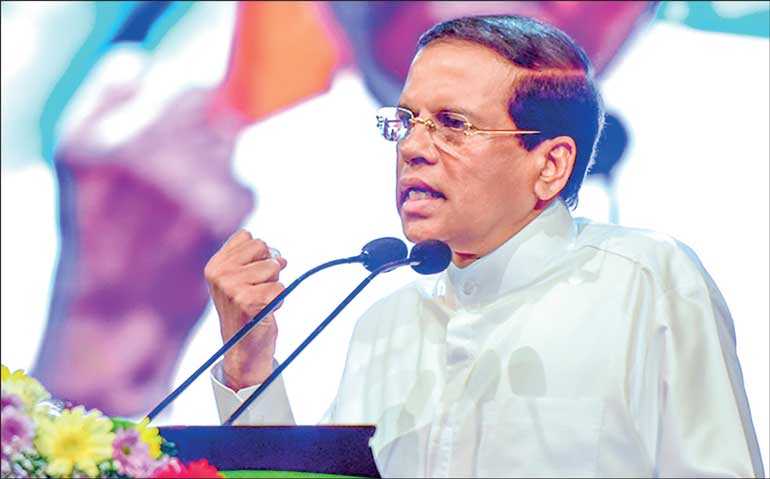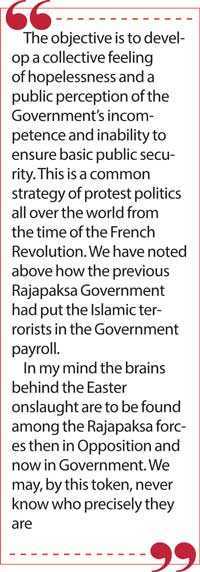Monday Feb 16, 2026
Monday Feb 16, 2026
Friday, 2 April 2021 00:08 - - {{hitsCtrl.values.hits}}

But Maithripala Sirisena isn’t bothered while every day is a new life for him – the past deeds going into oblivion like the passing away of mist in the mountain sky
“For the future of our country it is imperative that people’s power should grow to pre-empt any future innocuous response on the part of the political elite to a gargantuan mass tragedy of this nature”
 Preamble
Preamble
It is great that we writers domesticated overseas enjoy the natural right of free expression over aberrant and errant political developments taking place in the beautiful island we left behind. Somebody has to come out to the open sans fear of being shot down literally or incarcerated. I was part of a band of public servants who prided on our integrity and capacity to work for the people. It had been a different political ethos that prevailed those days when Sri Lanka was still basking [at the fading tail-end though] in the inherited glory that a disciplined British administration had left behind. It was year 1994 when I retired after 33 years of service right all the way to being a Ministry Secretary, to be domesticated in Australia.
Easter carnage
The Easter carnage that is again the vociferous talking point in the island, is in global terms a national man-made tragedy of the highest proportion. 268 human lives – children and adults – were blasted by a pre-planned and pre-conspired bomb attack in a Catholic church. Over 500 were injured and are aching in different stages of injury even today. All these were innocent folk at prayer – a situation where they would have least suspected murderous foul play.
Nothing done; nothing ever will be done
Two years have elapsed but no serious attempt has been made by Government to ferret out the culprits and bring them to account. This Government, the political beneficiary of that massacre, promised at election time to do just that, but it is clearly not interested in honouring that pledge. The Government’s priorities are evidently not here. If this happened in Australia or a Western country the criminals would have been caught within weeks. With modern intelligence technologies it is no big job to do so. What has been missing in the Lankan case is the absence of political will.
Absence of political will is a key clue
We laymen on the outside can only try and set up a narrative of the events with the available evidence which we amply derive from the internet technologies at hand. In that narrative the Government’s fake promise to seriously catch up with the events will necessarily give us a clue in constructing the story. The absence of political will comes naturally when the exercise of such will would endanger the ruling political regime. In place of earnest endeavours, one observes a myriad of pusillanimous acts of this Government to try and erect smokescreens and generate confusion in the minds of the wounded and their families and the concerned public.
The Catholic community is at last awakening up and is now evidently getting vociferous. We encourage them to build a Myanmar style protest movement that would set up a critical mass that would draw and magnetise the rest of the Lankan community. For the future of our country, it is imperative that people’s power should grow to pre-empt future innocuous response on the part of the political elite to a gargantuan mass tragedy of this nature.
We have two bits of evidence impinging on the matter of political will to act: First, during the previous Rajapaksa Government, the Defence Ministry had been making payments to fund some extreme Muslim terrorist organisations. It is unclear whether Zaharan himself had been a recipient. Second, a massacre of this sort succeeded in creating a public perception that the Yahapalana Government led by the then Prime Minister Ranil Wickremesinghe cannot ensure public security; is incompetent and must go. The point is that the clear beneficiary of the horrendous event was the defeated Rajapaksa Government.
 A relevant character trait of Maithripala Sirisena
A relevant character trait of Maithripala Sirisena
The defeat of Mahinda Rajapaksa and his Government in 2015 had been a shocking blow to that regime. The electoral defeat had been the culmination of a movement for good governance started by Revd Maduluwave Sobitha, a most respected and venerable monk, who unfortunately passed away not long after the Yahapalana Government that had been set up. The construction of the political alliance was a deliberate act of Revd Sobitha. At a crucial meeting to select a common candidate the name of Maithripala Sirisena, a recalcitrant senior minister of the then ruling Rajapaksa Government, came up as someone ‘willing.’ Revd Sobitha, the savvy man, is said to have posed a counter question to those present: “Is Sirisena reliable?” Ranil kept silent but Chandrika affirmatively is supposed to have responded: “100%!” This is how Maithripala Sirisena had been chosen as common candidate for presidency. Everyone threw in their weight and the ‘Maitri Yugaya’ started.
Innumerable video footages are available showing Sirisena scathingly attacking Mahinda Rajapaksa and his Government during election time that followed. Sirisena spared no compunction or scruple in slaying his former mates. His tongue did an enormous U-turn. When he eventually won, Sirisena announced that he was spared of going six feet underground! The various video footages are now part of the lore of public jocularity! But Sirisena isn’t bothered while every day is a new life for him – the past deeds going into oblivion like the passing away of mist in the mountain sky. He has got this unique acumen of making U-turns without batting an eyelid and remaking a return U-turn as though nothing in the world has happened. This character trait is relevant for the narrative I present. It is flexibility personified to the point of amorality.
The second U-Turn against the Yahapalana Government
This specific trait came into play again barely two and half years on the road to Yahapalanaya. By this time Sirisena had felt fatigued by the decisive role of his Prime Minister Ranil Wickremesinghe. The 19th Amendment had restricted the powers of the President and, correspondingly, increased the hold of parliament via its Prime Minister. It had been a compromised form of parliamentary government. This had dawned later like the tube light on President Sirisena who, by now, had become frustrated. Sirisena wanted to have a second term but the Government refused. It was time for a return U-turn toward the Rajapaksa camp. In fact, the rumour goes that Basil et al had been wooing Sirisena all along to return to the fold. Sharp-eyed Basil knew of the possibility. The mind game had started. Sira was trapped!
At the provincial government elections Sirisena slated his own Prime Minister Wickremesinghe calling him a ‘samanalaya;’ suggesting that he was a ‘bank robber,’ and so on. An opposition victory wasn’t difficult to predict. The Yahapalanaya Government lay fallen and diminished and open to further pummelling. Maithripala had by now established a confidence nexus with the mates he had once betrayed even after the hopper feed. He felt he was ‘the same old good boy.’ Basil et all were jubilant!
Wooing Sajith Premadasa
Sira’s next move was to target Sajith Premadasa knowing that the latter had all along never been close to Ranil Wickremesinghe. Sajith also had the hunch that being Premadasa Ranasinghe’s son the leadership of the party and Government must pass on to him as of right. Ranil had a different measure of the latter’s ability. The conflict was concealed but it had been live and seething.
Sirisena approached Sajith several times and there is video footage of a suggestive close up between Sajith and President Sirisena. Sajith repeatedly had referred to Sirisena reverently as ‘athigaru uthumanan.’ Despite this, Sajith was shrewd enough not to fall into Sirisena’s trap. It was premature and he knew he would fail in garnering party support against his leader. The mind game on, Sajith failed to break up the Grand Old Party at that stage but the wooing process fermented the germs of discontent that created a faction rift in the UNP and led to the break up and political decimation of that party much later.
No-confidence motions and the 52-day government
Sirisena never showed displeasure over the Rajapaksa opposition’s attempt to pass two successive no-confidence motions against Prime Minister Ranil Wickremesinghe. There had been high pressure lobbying but the motions flopped. The next was the desperate and illegal ousting of the Prime Minister and the setting up of the infamous 52-day government of Mahinda Rajapaksa. Ranil showed immeasurable restraint and maturity in response. He remained unmoved in Temple Trees and merely sought parliament disapproval of that move, which he received. With this superfine Ranil strategy the Rajapaksas were flabbergasted but the camp lost no heart.
Create a mass tragedy?
In the circumstances wouldn’t the construction of a mass tragedy be an effective catalyst? “Chaos and its chain reaction always defeat order, because it is better organised” [Terry Pratchett]. The objective is to develop a collective feeling of hopelessness and a public perception of the Government’s incompetence and inability to ensure basic public security. This is a common strategy of protest politics all over the world from the time of the French Revolution. We have noted above how the previous Rajapaksa Government had put the Islamic terrorists in the Government payroll.
In my mind the brains behind the Easter onslaught are to be found among the Rajapaksa forces then in Opposition and now in Government. We may, by this token, never know who precisely they are.
Onus on Sirisena is clear
To sum up, former President Maithripala Sirisena’s midterm alliance with the Yahapalanaya Opposition is established. That he was forewarned of the massacre and that he made no pre-emptive moves is clear. That he went to Singapore just at this time and for no urgent reason is clear. That he did not appoint anyone to act for him is clear. That he had deliberately kept the Prime Minister in the dark and blocked the latter from Security Council meetings is clear. The Opposition’s desire to oust the Yahapalanaya Government of Wickremesinghe is also clear. That the real figures or ‘mola kaarayao,’ of the monstrous bomb attack will never be found is also clear. Thus, what we know with some workable clarity is the role of the former president in this grim episode. The obvious thing to do is to prosecute the former president Sirisena and set aside other issues at least for the moment.
It is a hilarious act to give the former president special privileges in the current debate when he stands as a king pin in this episode. Member of Parliament Harin Fernando angrily pointed out a few days ago in parliament that the Speaker had allotted one hour for MP Maithripala Sirisena and only 10 minutes each for other MPs. These are not ritualistic slips of parliamentary procedure; they are emblematic of the overall general focus of the Government’s policy towards this whole damning episode.